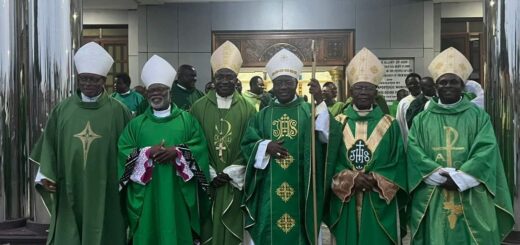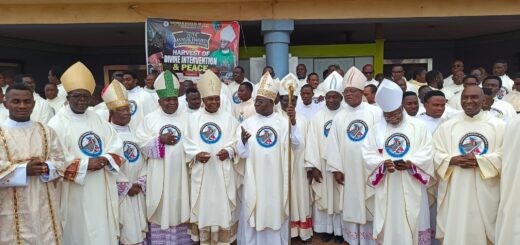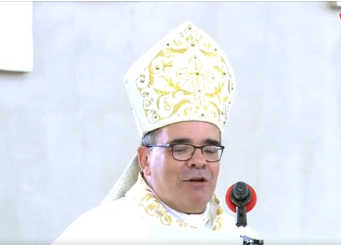Wisdom for Leadership
by ARCH BISHOP · July 26, 2020
by Archbishop I. A. Kaigama, at St. Agnes Parish Wuye, Abuja.
Readings: 1 Kings 3:5, 7-12; Romans 8:28-30; Matthew 13:44-52
The people of Israel left Egypt with Moses as their leader. He was succeeded by Joshua, followed by the Judges and Samuel. God was often consulted by these leaders. In the days of Samuel, the people asked for a king, and God directed Samuel to anoint Saul and later David as kings. Solomon, the son of David ascended the throne after his father and became the last king to rule over a united Israel.
Saddled with great leadership responsibilities, Solomon went to the altar of God at Gibeon to consult with the Lord, and to seek His blessing. God appeared to him in a dream and made him an open-ended offer: “Ask what you would like me to give to you” (1 Kgs 3:5). Solomon, rather than asking for wealth, long life, increase in military might or the destruction of his enemies, instead asked God for wisdom: “Give your servant a heart to understand how to discern between good and evil.” (1 Kgs 3:9) God was pleased to grant him this request and even much more.
King Solomon knew that a king could be misled by emotions, passions or tempted to assume false powers and could have the wrong allies, so he asked for a heart to understand how to discern between good and evil, truth and falsehood; a heart that truly identifies with his people, sensitive to their needs and welfare.
The lesson from this story of Solomon is that for the development and welfare of people, and to avoid promoting unjust economic structures that widen the rich-poor divide, a leader must be guided by divine wisdom, not mere intellectual knowledge. Like Solomon, leaders, whether religious, traditional or political, should have a truly compassionate, sensitive and understanding heart. Despite Solomon’s wisdom and the fact that the Lord appeared to him twice (3:5; 9:2), his political decline came because he did not remain faithful and obedient to God in serving the interests of his people.
A leader guided by divine wisdom respects human life, gives each person a sense of belonging, promotes an equitable distribution of available resources, recognizes the potentials in others and brings the best out of them in the interest of the common good. A wise leader equally is conscious of seeking heavenly things which endure forever.
In Africa, the craving for political power among politicians and even some religious leaders and the manipulations to achieve it is mind boggling. In the process, there are threats to life, unjust judicial pronouncements, buying votes or electoral and security officials, promoting the dubious interests of godfathers, dealing unfairly with political opponents and when power is “captured”, the accumulation of so much wealth at the expense of the ordinary people.
By comparing the Kingdom of God to a treasure in a field, to a pearl of great value and to a net thrown in the sea collecting all kinds of fish in our gospel reading, Jesus teaches us that the kingdom of heaven is hidden, but of surpassing value and that seeking this kingdom should remain our utmost priority. In the first parable a man stumbles into a treasure while in the second, we have a merchant who finds a pearl after a long search. One is due to luck and the other is due to diligence. This should make us realize that the kingdom of God is both a gratuitous gift from God and the fruit of searching on our part. The third parable about a drag-net tells us about judgment and eternity, where every man and woman would be judged according to their deeds on earth.
The lesson here is that we cannot take our treasures of material things, political power or achievements with us to eternal life. St. Paul refers in 1 Cor. 13:13 to faith, hope and love as treasures, but the greatest is love, because it is the only one that has eternal value.
As for wisdom, St James distinguishes three types: the wisdom from above (cf. 3:15-18), the wisdom of this world, and wisdom of the devil. Wisdom from above is acquired when we are connected to God through prayer and always being in His presence.
Our second reading offers us consolation by assuring us that nothing, whether calamities, violent conflicts or COVID-19 pandemic and other evils are new to God. Our God can turn everything to good. God can cause leaders to minimize or eradicate the negative consequences of these on people, but such leaders must first be free from corrupt practices. The recent revelations about pervasive corruption in some government sectors are terribly worrisome and unfortunate. The cost of governance and expenditures on partisan political strategies to “capture” power are scandalous in the face of a pandemic of poverty.
All hope is not lost however. There are still many good Nigerians: The recent appointment of Prof. Charles Egbu as Vice Chancellor of a UK University; Ikenna Nweke in Japan returned a missing wallet with huge sums of money to the police and also turned down offer of a percentage of the money and the heroism of Tolulope Arotile, a Nigeria Air force first ever female combat helicopter pilot who died and was buried with full military honours. Similarly, the Holy Father, Pope Francis, has conferred on Fr. Aloysius Udoh, Fr. Anthony Onyeso and Fr. Festus Nwadike, the title “Monsignor”. This is an honorary title usually bestowed on priests who have served the Church and society faithfully. We thank God for their lives and for their tireless and selfless service. Please, remain faithful to the end. Congratulations!
To us all, the kingdom of God is a treasure that is worth giving up everything in order to be part of it. By each one of us sacrificing to build a Nigeria of peace, justice and holiness, we can inherit the Kingdom of God.




